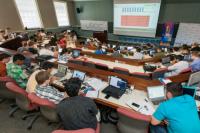-
China’s cyber statecraft is a far greater concern than cyber espionage
China has become notorious for its sponsorship of cyber industrial espionage, but such activity distracts attention from the country’s comprehensive cyber strategy, according to a new book, China’s Cyber Power. This strategy is designed to maintain domestic political cohesion, empower the Chinese military, and reshape global cyber governance.
-
-
Making passwords more secure – especially for mobile devices
Passwords are a necessary evil, indispensable for the purpose of ensuring data confidentiality. Unfortunately, the most secure passwords are also the ones that are most difficult to memorize. “Nobody likes passwords. In order to make their lives easier, many people use the same password for different accounts, or they choose passwords that are so easy to guess that they don’t provide sufficient protection,” said one researchers.
-
-
DHS S&T awards Charles River Analytics $500,000 for predictive malware defense research

Malicious cyber activity is growing at an unprecedented rate. A leading internet security firm reported there were more than 317 million new malicious code signatures in 2014. Additionally, attacks are increasing in sophistication as authors create malware that circumvents standard signature-based antivirus defense systems. DHS S&T has awarded $500,000 to Cambridge, Massachusetts-based Charles River Analytics to develop malware defense technology that will alert and empower information technology (IT) administrators to fend off an impending cyberattack.
-
-
Google Chrome vulnerability lets attackers steal movies, protected content
A security vulnerability in Google technology that is supposed to protect videos streamed via Google Chrome has been discovered by researchers from the Ben-Gurion University of the Negev Cyber Security Research Center (CSRC) in collaboration with a security researcher from Telekom Innovation Laboratories in Berlin, Germany. The vulnerability in the encryption technology, Widevine EME/CDM, opens an easy way for attackers to hijack protected content delivered via different popular streaming services, making the unprotected content available for illegal distribution.
-
-
Intelligence agencies spy on our data by manipulating computer chips
Researchers work to develop mechanisms that will render the Internet of Things more secure. They focus on a specific security gap: the manipulation of computer chips, that is, hardware components. These components can be found not only in PCs and laptops, but also in all other devices with integrated electronics; those include credit cards, cars, and smartphones, as well as large industrial facilities and medical equipment.
-
-
Cyber Guard 2016 aims to manage complexity in invisible domain
Between one million and ten million U.S. homes and businesses are without power. An oil spill from a near-shore refinery is gushing into the waters off Texas and Louisiana. The port of Los Angeles is shut down due to a network outage. Visitors to exercise Cyber Guard 2016 here viewed mock newscasts detailing these scenarios as examples of the likely effects of a massive cyberattack.
-
-
FBI's approach to digital investigations puts security at risk: Expert
A cybersecurity expert argues that the FBI’s recent and widely publicized efforts to compel Apple Computer to write software to unlock an iPhone used by a terrorist in California reflects an outdated approach to law enforcement that threatens to weaken the security of all smartphones, potentially putting the private information of millions of smartphone users at risk and undermining the growing use of smartphones as trusted authenticators for accessing online information.
-
-
Malware, data theft, scams: The risks of free livestreaming Web sites

Millions of people use free livestreaming websites to watch sports and other live events online, but this comes with a considerable security risk. Researchers have found that viewers are often exposed to malware infections, personal data theft, and scams. As much as 50 percent of the video overlay ads on free livestreaming websites are malicious.
-
-
Nation’s elite cybersecurity talent participate in U.S. Cyber Challenge program

A week from today, Illinois’ top cybersecurity talent will descend upon Moraine Valley Community College outside of Chicago to participate in the annual U.S. Cyber Challenge (USCC) Cyber Camp. During the week-long camp, individuals will participate in a variety of classes that cover such subjects as packet crafting and pen testing, and compete in a virtual Capture the Flag competition to demonstrate their cybersecurity abilities in a free-form environment in hopes of winning one of the limited (ISC)2 scholarship vouchers.
-
-
NIST to refine Cybersecurity Framework after comments from stakeholders
NIST is developing a minor update of its Cybersecurity Framework based on feedback from its users. In the just-released Cybersecurity Framework Feedback: What We Heard and Next Steps, NIST is announcing that a draft of the update will be published for comment in early 2017.
-
-
Terrorists gaining cyber capability to bring major cities to a standstill: U.K. intelligence chief
Robert Hannigan, the director of GCHQ, the British equivalent of the U.S. NSA, has warned that terrorists and rogue states are gaining the technical capability to bring a major city to a standstill with the click of a button. He said that the risk to cities like London would significantly increase as more physical objects – cars, household appliances — are connected online in what is called the Internet of Things.
-
-
Weak spots in Europe’s “Right to be Forgotten” data privacy law
Under Europe’s “Right to be Forgotten” law, citizens there can petition Internet search providers such as Google to remove search results linked to personal information that is negative or defamatory. In many cases, these links lead to information about accusations of criminal activity or financial difficulties, which may be “delisted” if the information is erroneous or no longer relevant. But “gone” doesn’t always mean “forgotten,” according to a new study.
-
-
Closing security gaps in the Internet of Things
Cars, fridges, household appliances – in the future, many everyday items will be online. This opens up numerous new targets for attacks. IT experts are developing protection mechanisms. The experts are developing a new method for detecting and fixing vulnerabilities in the applications run on different devices — regardless of the processor integrated in the respective device.
-
-
Electronic anti-theft systems pose a threat to cardiac device patients
Researchers say that electronic anti-theft systems still post a threat to cardiac device patients. Experts say that even though reported events are rare, prolonged exposure to electronic anti-theft systems, also called electronic article surveillance (EAS) systems, can cause pacing therapy to drop beats or in the worst case leave pacemaker dependent patients with no heartbeat, and cause ICDs to deliver inappropriate shocks.
-
-
Hackers could easily cause drones to ignore human controllers, or crash
Sales of drones — small flying machines equipped with cameras — are soaring. But new research by a computer security team has raised concerns about how easily hackers could cause these robotic devices to ignore their human controllers and land or, more drastically, crash. The researchers say that more secure flying devices are needed for aerial deliveries and photography.
-
- All
- Regional
- Water
- Biometrics
- Borders/Immig
- Business
- Cybersecurity
- Detection
- Disasters
- Government
- Infrastructure
- International
- Public health
- Public Safety
- Communication interoperabillity
- Emergency services
- Emergency medical services
- Fire
- First response
- IEDs
- Law Enforcement
- Law Enforcement Technology
- Military technology
- Nonlethal weapons
- Nuclear weapons
- Personal protection equipment
- Police
- Notification /alert systems
- Situational awareness
- Weapons systems
- Sci-Tech
- Sector Reports
- Surveillance
- Transportation
Advertising & Marketing: advertise@newswirepubs.com
Editorial: editor@newswirepubs.com
General: info@newswirepubs.com
2010-2011 © News Wire Publications, LLC News Wire Publications, LLC
220 Old Country Road | Suite 200 | Mineola | New York | 11501
Permissions and Policies
Editorial: editor@newswirepubs.com
General: info@newswirepubs.com
2010-2011 © News Wire Publications, LLC News Wire Publications, LLC
220 Old Country Road | Suite 200 | Mineola | New York | 11501
Permissions and Policies
